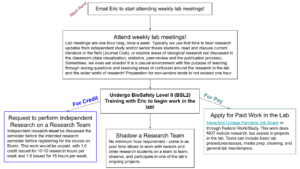Only a demonstrated interest in the fields of microbiology, evolution, and ecology is required — this could be your first experience working in these areas. We welcome students at all levels (first-year, sophomore, junior, or senior) students into the MEE lab. First-year students are welcome to attend lab meetings, but may not begin work in the lab (shadowing, work/study, independent research) until their sophomore year.
What does this actually mean? There are 4 different ways to participate in the MEE Lab:
- Come attend our open lab meetings from 10:00-11:00 on Fridays (Fall 2023) in the Sharpless Bio Lounge or in the Johnson/Miller write-up area (across the hall from the Bio Lounge.)
- Shadow a research team in the MEE lab as your time allows
- Request to perform independent research-for-credit on one of our research teams
- Apply for paid work in the laboratory, using the advertisement on the Haverford College Part-time Job Board. Positions normally start in August and end in May.
Once a student actively participates in our lab meetings for at least one semester, then we can discuss shadowing and independent research. Please express an interest in the lab to Eric, either in person or via email. The first step is attending our weekly lab meetings.
As we work in a Biosafety Level 2 laboratory, safety and training are quite important before starting any work in the laboratory, whether it be shadowing, independent research, or paid work. I train students to work in a BSL-2 laboratory only at the start of semesters, but please contact me (Eric) before the semester in which, ideally, you would like to work.
After training, you would then shadow Eric or other students with their work before starting research on one of the teams below:
A) Experimentally evolving bacteria in different environments as part of a long-term evolution project (such as this one).
B) Synthesizing bacteriocins (proteins that bacteria make to kill other bacteria) and measuring how bacteria produce and react to these compounds.
C) Evolving bacteriophage (viruses that target bacteria) to interact with mixed populations of starving bacteria and dividing bacteria.
